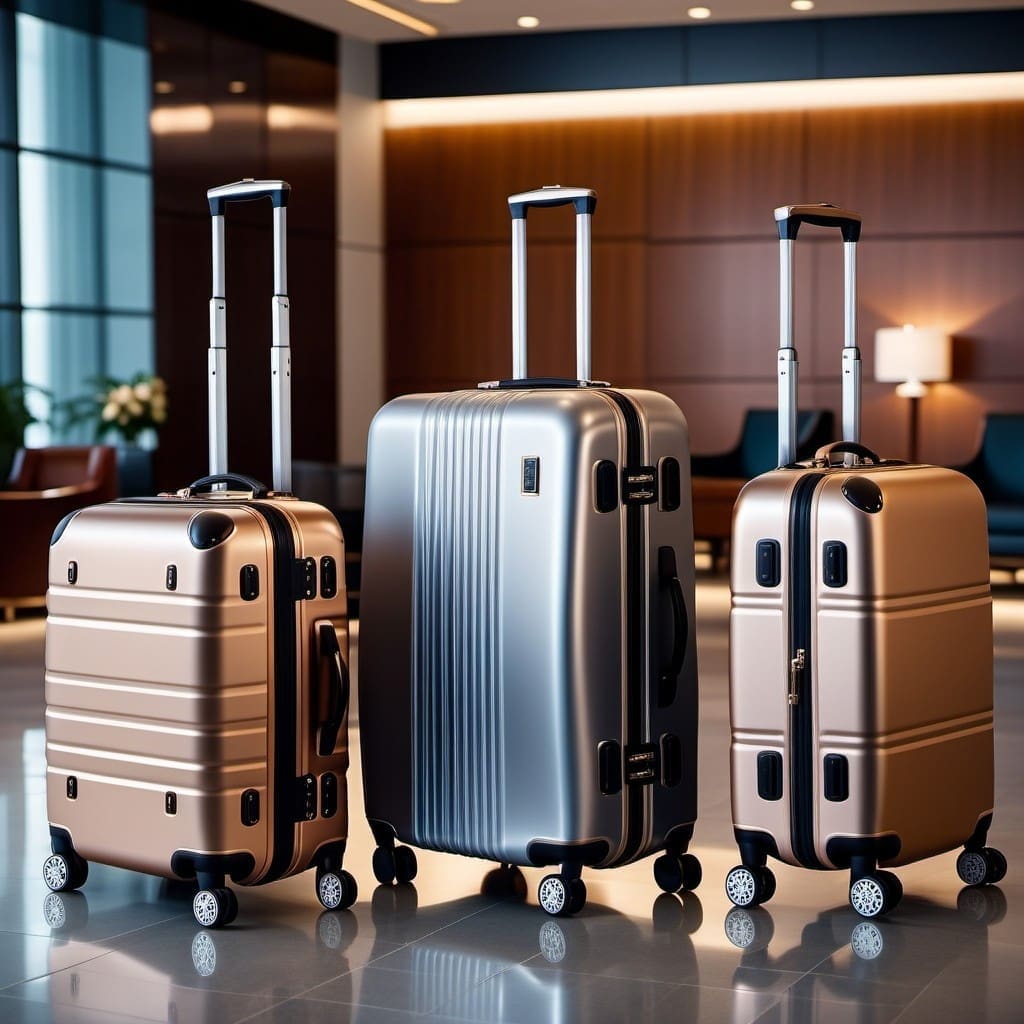When it comes to selecting checked luggage for your travels, you may find yourself pondering between hard shell and soft shell options. The choice between these two types can greatly impact the durability of your luggage throughout your journeys.
From moving through busy airports to enduring rough handling, the durability of your luggage plays a vital role in ensuring your belongings remain protected.
As you weigh the pros and cons of hard shell versus soft shell luggage, consider the factors of impact resistance, weather resilience, flexibility, and overall weight to make an informed decision on what best suits your travel needs.
Key Takeaways
- Hard shell luggage excels in scratch resistance and impact protection.
- Soft shell luggage offers flexibility for overpacking and tight spaces.
- Hard shell luggage is heavier but provides better weather resistance.
- Soft shell luggage is lighter and more maneuverable, suitable for varied packing needs.
Durability Comparison
When comparing the durability of hard and soft shell checked luggage, the materials used play an essential role in determining their resilience to wear and tear during travel.
Hard shell luggage tends to be more scratch-resistant than soft shell luggage due to its tough polycarbonate or aluminum exterior. These materials provide a sturdy barrier against scratches from rough handling or friction with other items.
Soft shell luggage, on the other hand, is often made of fabrics like nylon or polyester, which are prone to showing signs of wear and tear more easily.
While both types of luggage have their strengths, if scratch resistance is a priority for you, then hard shell checked luggage may be the better choice for your travels.
Impact Resistance
For travelers concerned about how well their luggage can withstand impacts during transit, understanding the differences in impact resistance between hard and soft shell checked luggage is essential. When it comes to impact resistance, hard shell luggage generally performs better than soft shell luggage due to its rigid construction. Here’s why:
- Material: Hard shell luggage is often made from materials like polycarbonate or aluminum, offering superior protection in a drop test.
- Shell Integrity: The hard exterior of hard shell luggage retains its shape and protects your belongings.
- Scratch Resistance: Hard shell luggage tends to have better scratch resistance, maintaining its appearance over time.
- Internal Protection: Soft shell luggage may absorb some impact, but hard shell luggage provides a more robust barrier against external forces.
Weather Resistance
Considering the impact of various weather conditions on your luggage’s durability, the distinction between hard and soft shell checked luggage becomes essential. When it comes to weather resistance, hard shell luggage generally provides better moisture protection due to its waterproof materials. Soft shell luggage, conversely, can absorb water, making it less suitable for rainy or humid environments. Concerning snow performance, hard shell luggage is easier to clean off snow and less likely to get damaged by extreme cold temperatures compared to soft shell luggage. Here’s a comparison table to illustrate the differences:
| Weather Resistance | Hard Shell Luggage | Soft Shell Luggage |
|---|---|---|
| Moisture Protection | Waterproof materials provide better protection | Can absorb water, less suitable for rain |
| Snow Performance | Easy to clean off snow, withstands cold better | More prone to damage in extreme cold |
Flexibility and Overpacking
To evaluate the Flexibility and Overpacking aspect of hard and soft shell checked luggage, it’s essential to examine how each type accommodates varying packing needs and adaptability to different situations.
When considering Flexibility vs rigidity:
- Soft shell luggage offers more flexibility regarding squeezing into tight spaces or fitting in extra items.
- Hard shell luggage provides better protection for delicate items due to its rigid structure.
Regarding Overpacking challenges:
- Soft shell luggage tends to allow for overpacking regarding its expandable nature, but this can lead to exceeding weight limits.
- Hard shell luggage’s fixed capacity helps prevent overpacking, ensuring you stay within airline restrictions and avoid excess baggage fees.
Overall Weight and Maneuverability
When comparing hard and soft shell checked luggage, the weight and maneuverability factor plays an important role in determining the practicality and ease of travel.
Hard shell luggage tends to be heavier due to its construction, which can limit the amount of items you can pack before reaching weight restrictions. Soft shell luggage, on the other hand, is generally lighter, allowing for more flexibility with packing without exceeding weight limits.
Maneuverability is also affected by weight distribution; hard shell cases can be more cumbersome to handle, especially in tight spaces, whereas soft shell luggage offers better handling and flexibility.
Additionally, the storage capacity of soft shell luggage often allows for easier transport, as they can sometimes be compressed to fit in tight spaces more easily than hard shell counterparts.
Frequently Asked Questions
Can Hard Shell Luggage Be Repaired if It Gets Dented or Scratched During Travel?
If your hard shell luggage sustains dents or scratches during travel, repair options are limited. While durable, these damages can be difficult and costly to fix. Consider this when evaluating the overall durability of hard shell luggage.
How Does the Material of Soft Shell Luggage Affect Its Resistance to Abrasions and Tears?
When selecting soft shell luggage, consider material strength for resistance to abrasions and tears. Fabrics like ballistic nylon or polyester offer excellent durability. Impact resistance varies based on the weave and denier of the material. Choose wisely for lasting protection.
Are There Any Specific Care Instructions for Maintaining the Weather Resistance of Both Hard and Soft Shell Luggage?
To maintain the weather resistance of your luggage, follow these steps: For hard shell, wipe with a cloth and mild soap. For soft shell, spot clean with a damp cloth. Store in a dry place. Treat soft shell with a water repellent spray.
How Does the Flexibility of Soft Shell Luggage Affect Its Ability to Fit in Tight Spaces or Overhead Compartments?
When it comes to soft shell luggage, flexibility offers advantages in fitting into tight spaces like overhead compartments. However, this flexibility can also lead to storage space limitations compared to hard shell luggage, which maintains its shape.
Are There Any Weight Limits or Restrictions for Hard Shell Luggage in Terms of Overpacking?
When it comes to weight restrictions and overpacking, hard shell luggage can be more limiting than soft shell options. Overpacking a hard shell can affect its impact resistance and durability compared to soft shells that offer more flexibility.
Conclusion
To summarize, when it comes to durability, hard shell checked luggage edges out soft shell options due to its superior impact and weather resistance.
While soft shell luggage may offer more flexibility and overpacking capabilities, the overall weight and maneuverability of hard shell luggage can’t be overlooked.
Ultimately, choosing between hard shell and soft shell checked luggage depends on your specific travel needs and priorities. Consider the pros and cons carefully before making your decision.














